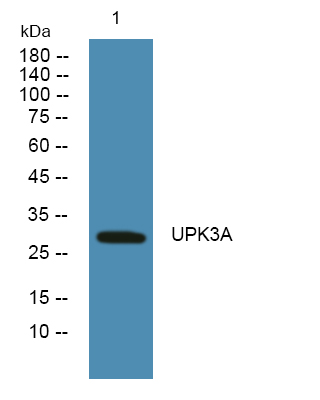Uroplakin III (ABT-UPK3) mouse mAb (Ready to Use)
- Catalog No.:YM6138R
- Applications:IHC
- Reactivity:Human;Mouse;
- Target:
- Uroplakin III
- Fields:
- >>Bladder cancer
- Gene Name:
- UPK3A UPK3
- Protein Name:
- Uroplakin-3a (UP3a) (Uroplakin III) (UPIII)
- Human Gene Id:
- 7380
- Human Swiss Prot No:
- O75631
- Immunogen:
- Synthesized peptide derived from human Uroplakin III AA range: 200-287
- Specificity:
- The antibody can specifically recognize human Uroplakin III protein.
- Formulation:
- The prediluted ready-to-use antibody is diluted in phosphate buffer saline containing stabilizing protein and 0.05% Proclin 300
- Source:
- Mouse, Monoclonal/IgG1, Lambda
- Dilution:
- Ready to use for IHC
- Purification:
- The antibody was affinity-purified from ascites by affinity-chromatography using specific immunogen.
- Storage Stability:
- 2°C to 8°C/1 year
- Background:
- This gene encodes a member of the uroplakin family, a group of transmembrane proteins that form complexes on the apical surface of the bladder epithelium. Mutations in this gene may be associated with renal adysplasia. Alternatively spliced transcript variants have been described.[provided by RefSeq, Nov 2009],
- Function:
- disease:Defects in UPK3A are a cause of renal adysplasia [MIM:191830]; also known as renal agenesis or renal aplasia. Renal agenesis refers to the absence of one (unilateral) or both (bilateral) kidneys at birth. Bilateral renal agenesis belongs to a group of perinatally lethal renal diseases, including severe bilateral renal dysplasia, unilateral renal agenesis with contralateral dysplasia and severe obstructive uropathy.,function:Component of the asymmetric unit membrane (AUM); a highly specialized biomembrane elaborated by terminally differentiated urothelial cells. May play an important role in AUM-cytoskeleton interaction in terminally differentiated urothelial cells. It also contributes to the formation of urothelial glycocalyx which may play an important role in preventing bacterial adherence.,similarity:Belongs to the uroplakin-3 family.,subcellular location:Heterodimer formation
- Subcellular Location:
- Membranous, Cytoplasmic
- Expression:
- Expressed in ureter.
- June 19-2018
- WESTERN IMMUNOBLOTTING PROTOCOL
- June 19-2018
- IMMUNOHISTOCHEMISTRY-PARAFFIN PROTOCOL
- June 19-2018
- IMMUNOFLUORESCENCE PROTOCOL
- September 08-2020
- FLOW-CYTOMEYRT-PROTOCOL
- May 20-2022
- Cell-Based ELISA│解您多样本WB检测之困扰
- July 13-2018
- CELL-BASED-ELISA-PROTOCOL-FOR-ACETYL-PROTEIN
- July 13-2018
- CELL-BASED-ELISA-PROTOCOL-FOR-PHOSPHO-PROTEIN
- July 13-2018
- Antibody-FAQs
- Products Images

- Human bladder tissue was stained with Anti-Uroplakin III (ABT-UPK3) Antibody

